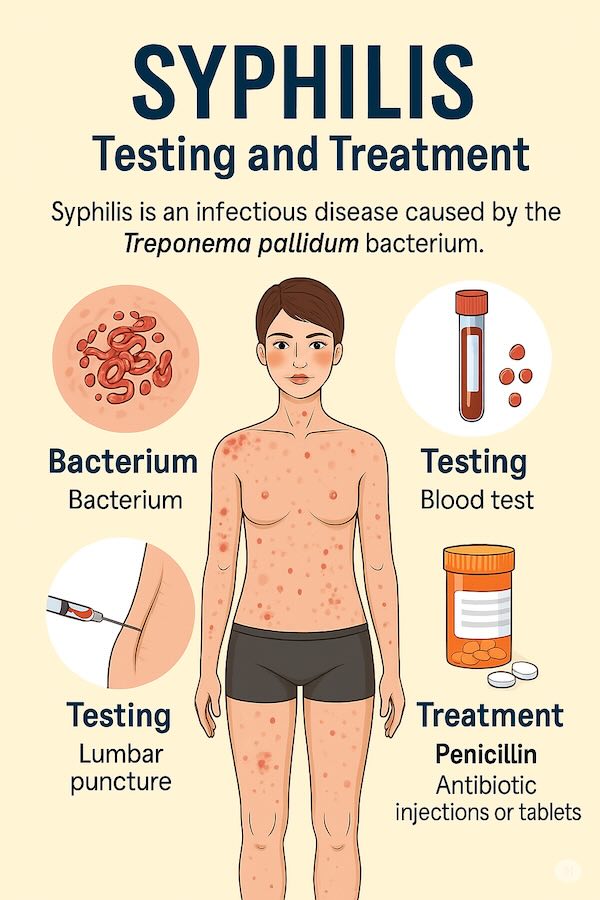Syphilis is a growing health concern, but it’s important to know it is completely curable with proper medical care. Understanding the symptoms is the first step to protecting your health. This guide provides straightforward information on recognizing syphilis and where to find confidential help in Derma Clinic Kathmandu Nepal.
What is Syphilis?
Syphilis is a bacterial infection passed through sexual contact. It can also be transmitted from a mother to her baby during pregnancy. It is not spread by sharing toilets, clothes, or cutlery.
Its symptoms can be mistaken for other conditions, which is why professional diagnosis is essential. The infection appears in stages:
- Primary Stage: It often starts with a single, firm, and painless sore (called a chancre) at the site of infection—usually the genitals, anus, or mouth. This sore heals on its own in a few weeks, but the infection remains in your body.
- Secondary Stage: Weeks later, you may develop a non-itchy rash, classically on the palms of your hands and soles of your feet. You might also experience fever, fatigue, sore throat, or swollen glands. These symptoms will also disappear, but the infection continues to progress internally.
- Latent & Tertiary Stages: This is the hidden phase where you have no symptoms, which can last for years. If left untreated, syphilis can eventually enter the tertiary stage, causing serious damage to the brain, nerves, heart, and other organs.
Getting Tested: The Only Way to Know
How We Test for Syphilis
We use simple and reliable blood tests to check for syphilis. There are generally two types of tests that work together:
- Screening Tests (like RPR or VDRL): These tests look for antibodies that your body produces in response to the infection. A “Reactive” result suggests a possible infection and requires a confirmation test. The level of these antibodies, called a “titer,” also helps us monitor your treatment to make sure it’s working.
- Confirmatory Tests (like TPHA): If your screening test VDRL is reactive, this test is used to confirm a syphilis infection. These tests detect antibodies specific to the syphilis bacteria.
- We do Serology test like HIV, HBsAG, HCV to the patient who comes for test for syphilis just to rule other other possible STI’s.
A “Non-Reactive” or “Negative” result from a screening test usually means you do not have syphilis, but there are exceptions. A “Reactive” or “Positive” result on both types of tests confirms you have a current or past infection, and our doctors will guide you on the next steps for treatment.
When Can a Test Show a False Negative?
It’s important to understand that in some situations, a test might come back negative even if you have the infection. This can happen if:
- HIV Co-infection: Having HIV can sometimes affect the body’s immune response and may interfere with syphilis test results.
- You Test Too Early: There is a “window period” of a few weeks (up to 90 days in some cases) after exposure before your body produces enough antibodies to be detected. If you test during this time, the result may be negative.
- You Are in a Very Early or Late Stage: The tests are most accurate during the secondary stage of syphilis. In the very early primary stage or the late tertiary stage, antibody levels might be too low to be detected.
- The “Prozone” Effect: In rare cases, especially during the highly infectious secondary stage, the level of antibodies can be so high that it overwhelms the test, causing a false negative.
At Derma Clinic Kathmandu, we provide confidential and accurate blood tests in a completely private setting. Our focus is on your comfort and providing clear, reliable results.
Treatment: Syphilis Can Be Cured
The most important message is that syphilis is curable. The infection is treated effectively with antibiotics, usually penicillin. The type and duration of treatment depend on the stage of the infection.We also manage alternative treatments for patients with penicillin allergies with Doxycycline. Completing the full course of medication is crucial to clearing the infection.
How Long Do Syphilis Tests Stay Reactive After Treatment?
This is a very common question we get at Derma Clinic Kathmandu. Understanding how your test results change after successful treatment is key.
- For the VDRL (or RPR) Test: After you are treated, the “titer,” or level, of this test should decrease significantly over 6 to 12 months. In many people, it becomes “Non-Reactive” over time. However, for some individuals, the VDRL test may remain reactive at a very low, stable level for a long time, sometimes for life. This is known as a “serofast” state and does not mean you are still infectious or need more treatment. Our doctors monitor your VDRL titers to confirm the treatment was successful.
- For the TPHA Test: This confirmatory test detects antibodies that your body creates specifically against the syphilis bacteria. These antibodies usually remain in your blood for the rest of your life, even after you have been completely cured. Therefore, a reactive TPHA test simply indicates you have had a syphilis infection in the past. It is not used to monitor treatment success.
Can I Transmit Syphilis with a Low Titer?
This is an excellent and important question. The answer depends entirely on whether you have been treated. Here’s a straightforward explanation for both scenarios.
- If You Have Been Treated: After completing your full treatment, your VDRL test may remain reactive at a low, stable level (a “serofast” state). In this case, you are generally not considered infectious. The low titer is like an immune system memory of the old infection, which has been cured. Your doctor at Derma Clinic will confirm that your treatment was successful and that you pose no risk to your partners.
- If You Are Untreated: An untreated person with a low titer can absolutely still be infectious. A low number does not mean low risk. This can happen in the very early stages before your body has mounted a full immune response, or during the latent stage. As long as the bacteria are active in your body, regardless of the titer level, you can pass the infection to others.
Our experienced Venereologist at Derma Clinic Kathmandu will prescribe the correct treatment based on your specific situation and ensure all your questions are answered.
Got More Question Check out our FAQ Section of Syphilis
Price for Syphilis Test in Kathmandu:
Syphilis test Price is Kathmandu Nepal is:
VDRL/RPR: Rs 500
VDRL/RPR in Titer: Rs 800
TPHA: Rs 800
TPHA in Titer: Rs 1000
Other Serology Test Price:
HIV: Rs 500 (KIT). Rs 1500 (CLIA)
HBsAg: Rs 500(KIT) Rs 1500 (CLIA)
HCV: Rs 500 (Kit) Rs 1500 (CLIA)
Take the Next Step for Your Health
If you have noticed any of these symptoms of Syphilis or are concerned about possible exposure, the best thing to do is speak with a Consultant Venereologist (Doctor). Ignoring it won’t make it go away, and early treatment prevents future complications.
Your health and privacy are our priority. Contact Derma Clinic Kathmandu for a confidential consultation, testing, and treatment.
Call us at 9801358600 or visit Derma clinic for details. We are here to help.


